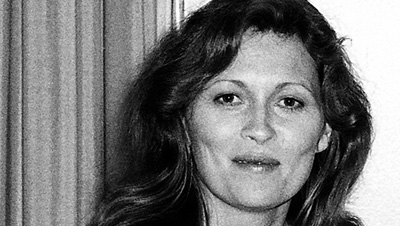
- Industry
Faye Dunaway
Dorothy Faye Dunaway was born in rural Bascom Florida on January 14, 1941. She studied theater at Boston University, majoring in Liberal Arts in 1962, joined the training program at New York’s Lincoln Center taught by Elia Kazan where she learned Method acting. She looked to Eleonora Duse as her role model. She performed in the off-Broadway play Hogan’s Goat (1965) by William Alfred, who became her mentor. She had already acted in two films, The Happening with Anthony Quinn and Hurry Sundown with Michael Caine and Jane Fonda, that had not yet been released, when she was cast by director Arthur Penn and producer Warren Beatty in Bonnie and Clyde (1967), the film that made her a star.
Dunaway said to the journalists of the HFPA in 1977, “Bonnie was the closest to me, because her general background was similar to mine, I’m a Southern girl, we come from the same area of the country, so there were elements in her that I understood instinctively, rather than having to read books and do a lot of research. I tended to get into more urban, sophisticated characters later on, but that’s not really who I am at all.”
She sued producer Otto Preminger, after clashing with him on the set of Hurry Sundown, to be released from her six-picture contract and won, even though, she said, “it cost me a lot of money.” But that freed her to star in other interesting films of the late 1960s early 70s: with Steve McQueen in The Thomas Crown Affair (1968) by Norman Jewison, with Kirk Douglas in The Arrangement (1969) directed by Elia Kazan from his novel, with Dustin Hoffman in Little Big Man (1970) by Arthur Penn, with Jack Nicholson in Chinatown (1974) directed by Roman Polanski from a screenplay by Robert Towne, with Robert Redford in Three Days of the Condor (1975) by Sydney Pollack, with Peter Finch and William Holden in Network (1976) directed by Sidney Lumet from a screenplay by Paddy Chayefsky. Most people remember this line from Network, “I’m as mad as hell, and I’m not going to take this anymore,” yelled by Peter Finch, but this phrase delivered by Faye Dunaway is descriptive of the type of career woman she played, “I apparently have a masculine temperament, I arouse quickly, consummate prematurely, and can’t wait to get my clothes on and get out of that bedroom.” Dunaway explains: “Diana felt that she could not handle a personal life, it was obliterated by her professional life, and that’s her tragedy. She behaved very much like a man but she was a woman, which makes a point.”
In real life Dunaway had love affairs with comedian Lenny Bruce, with photographer Jerry Schatzberg, with Marcello Mastrioanni, after they co-starred in Gli Amanti (A Place for Lovers, 1968) by Vittorio De Sica, she married rock musician Peter Wolf (1974-79).
In 1980 she had a son, Liam, with British photographer Terry O’Neil, married and moved to London. When she played Joan Crawford in Mommie Dearest (1981) from the memoir by her daughter Christina, her performance was criticized as over the top; the film has since become a camp classic. She said to HFPA in 1987: “It’s probably some of my best work, but, for better or for worse, one is associated with the persona that is created by the roles you play, and I don’t want that baggage. I played women like Joan Crawford, who were irretrievably wounded, who hurt themselves and other people. But in general my concentration was my son, my husband, my life in England; and that time in Europe was very nourishing for me. You have to start with life and that means relationships, that’s where you’re happiest, and, incidentally, if you haven’t got that, then you have nothing to bring to your work.”
After her divorce, Dunaway returned to New York, to her old apartment on Central Park West, and made several films in the late 1980s and 90s. She acted with Mickey Rourke in Barfly (1987) directed by Barbet Schroeder from the Charles Bukowski’s short story, with Natasha Richardson in The Handmaid’s Tale (1990) by Volker Schlondorff, with Johnny Depp in Arizona Dream (1993) by Emir Kusturica, with Marlon Brando and Johnny Depp in Don Juan DeMarco (1995), with Gene Hackman in The Chamber (1996) directed by James Foley from the 1994 John Grisham novel. Dunaway, who had moved to Beverly Hills with her son, returned to the stage with Master Class (1997), a play by Terence Mc Nally about Maria Callas, and has been trying to turn it into a movie ever since.
When she was honored at the Locarno Film Festival last summer, she said the film, which she is directing, will be ready in 2015. Dunaway had this to say to HFPA about her co-stars and directors: “I love Warren Beatty, we’re old friends. He’s really formidable and very creative, what he did with Bonnie and Clyde has changed cinema history forever. Jack Nicholson is the king of Hollywood, a great pal; he has enormous distinction as an artist and as a person, a good heart. Dustin Hoffman is an exceptionally generous actor. Robert Redford is wonderful and very affectionate. William Holden was a genuinely caring man. Polanski is a great film director, we just happened to collide at a moment when both of us were under enormous tension and pressure, but I have always had a great respect for Roman.” The Hollywood Foreign Press nominated Faye Dunaway as New Star of the Year for Hurry Sundown (1968), honored her with 3 Golden Globes, for Network (1978), Ellis Island (TV-1985), Gia (TV 1999) and 7 nominations, for Bonnie and Clyde (1968), Puzzle of a Downfall Child (1971), Chinatown (1975), Three Days of the Condor (1976), Barfly (1988), Columbo: It’s All in the Game (TV-1994), Running Mates (TV-2001).